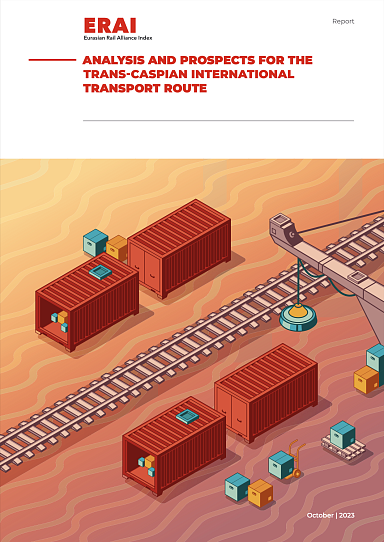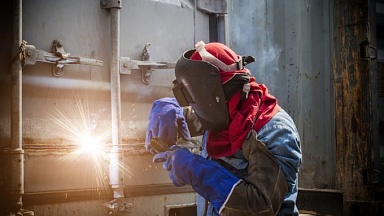The TITR began operating in 2017. The length of the route is 11,000 km. The current throughput is 6 million tons per year. By 2025, it is planned that this volume will reach 10 million tons per year .
In 2022, the volume of cargo transportation along the TITR route increased 2.5 times and reached 1.48 million tons. 33,600 TEUs were transported along the route, which is 33% more than last year. Exports of Kazakhstani cargo increased 6.5 times compared to 2021 and amounted to 891,000 tons. However, in 2022, there was a decline in the volume of transit traffic by 3.5%, to 257,500 tons, as well as container traffic — by 25% with a final volume of 11,000 TEU.
Currently, the shipper can find out the complex tariff rate for transporting a container from documents approved by the TITR member countries for the entire year. For example, the approved rate from January 1 to December 31, 2023 on the TITR’s Altynkol — Aktau — Govsan — Boyuk-Kyasik — Gardabani — Batumi — Constanta route is $3,797/FEU . By comparison, shippers can use the ERAI index, which provides easy access to the current cost of rail transit services along the Eurasian route. Thus, according to data as of August 2023, the ERAI index for transit along the Dostyk / Altynkol — Brest / Bruzgi / Svisloch / Kaliningrad rout was equal to 2,943 dollars /FEU .
The cost of transit along the Eurasian route is 30% lower than the cost of cargo transportation along the TITR, which is undoubtedly an important factor for shippers. In terms of cargo delivery times, the TITR is also inferior to the Eurasian route, along which the transit time on the China-Europe-China route ranges from 5 to 7 days. During the same time, cargo from China will only be delivered via TITR to Azerbaijan. Multimodal transportation with a change in modes of transport between rail, road and ferry leads to increased costs, risks to the safety of cargo, and also slows down its processing, in comparison with rail transportation along the Eurasian route.
The continued attractiveness of the TITR for China is due to its desire to develop its western provinces and provide them with access to regional markets. At the same time, one cannot draw a conclusion about the ability of the TITR to «pull» the entire volume of cargo for delivery to Europe. China is focusing on this route, subject to its economic efficiency.
The EU countries are now extremely interested in the development of the route, as they consider this transport corridor as one of the main ones for the delivery of goods from China, since it bypasses Russia.
Turkey, Azerbaijan and Kazakhstan are equally interested in the route for their own reasons. In the context of the development of the TITR, Azerbaijan sees an opportunity to strengthen its transit role and become the largest transport hub. Turkey, in turn, continues to extend its influence to Azerbaijan and Central Asia. The development of the TITR also contributes to an increase in supply volumes between the three countries. Thanks to the transport corridor, large volumes of Kazakh grain will be supplied to Azerbaijan and Turkey, and Azerbaijani fruits and vegetables to Kazakhstan.
Corridors such as the TITR and the Lapis Lazuli Corridor increase the connectivity of countries in Central Asia and the Middle East. The fundamental purpose of transit along the route is replaced by an opportunity for individual participants to enhance their advantageous geostrategic location.




